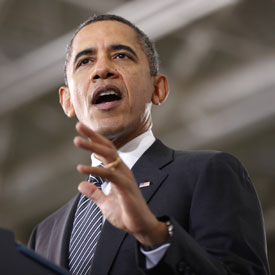Obama’s budget: more spending, higher taxes
US President Barack Obama’s $3.8tr budget calls for “shared responsibilities” – but Republicans say he has broken his promise to slash the deficit.

It’s the budget so clearly pitched for election year that President Obama laid out his plans, not in Washington – but at a campaign-style event in a swing state. In a community college in Northern Virginia, Obama set out his credentials as a defender of the middle class, combining spending pledges with a new tax system designed to end tax breaks for the rich.
“We can’t just cut our way into growth”, he told the crowds, before invoking that “fairness” mantra again, calling his budget a “reflection of shared responsibiliites”.
Among the proposals – more than $800bn for job creation and infrastructure investment, including roads, railways and schoolsl. Tax breaks for firms that create American jobs. Special help for communities affected by the manufacturing slump, and millions to prevent lay-offs among teachers and front-line workers.
And, in a pitch to those college students who have grown rather disillusioned with the president who once seemed the epitome of cool, there is a promise to hike the education budget by 2.5 per cent and increase aid for community colleges.
No more tax breaks
To pay for it all – an end to the Bush era tax cuts, along with the so-called Buffett rule, named after the billionaire tycoon Warren Buffett, imposing a minimum 30 per cent tax on millionaires. For the first time, the tax on investment dividends would be raised from the current 15 per cent rate to almost 40 per cent. Remember that fuss about Romney paying less tax on his income than all but the dirt poor? Precisely.
All of this is not class warfare, according to Obama – “just common sense, because Warren Buffet is doing fine. I’m doing fine. We don’t need the tax breaks. You need them… You’re the ones who deserve a break.”
Obama’s budget is an insult to the American taxpayer. Mitt Romney
And, according to the White House, those tax changes should yield an income of approximately $1.5tr over 10 years. So while the budget predicts the deficit will remain above a trillion dollars this year and next, it would then begin to decline.
A red rag to the Republicans, who have seized on Obama’s promise, back in 2009, to halve the deficit by the end of his first term: a promise he certainly will not be able to keep. “The president’s budget is a gloomy reflection of his failed policies of the past, not a bold plan for America’s future,” railed House Speaker John Boehner, while would-be White House challenger Mitt Romney called it an “insult to the American taxpayer”.
Clear blue water
Obama’s plans are certain to be blocked by the Republican majority on the Hill: but what this budget lacks in achievablility, it makes up for in ideology – drawing a clear line between the two parties. The Democrats want to draw down the deficit – eventually – without compromising key spending and federal investments, while the GOP is all about smaller government, lower taxes, and steep cuts to those twin entitlement behemoths, Medicare and Medicaid.
This, then, is the budget which is destined for gridlock: if there is no grand vision, there is a set of measures aimed at rallying the Democratic base which the Republicans are already pledged to oppose. It sets the scene for the big showdown at year’s end, when those Bush-era tax cuts will expire, the debt ceiling needs to be renegotiated, and the size of spending cuts must be agreed.
Hope springs
And while the Republicans might have the upper hand in Congress, Obama might take heart from this. Since his “pivot to jobs” which turned job creation, not the deficit, into the number one priority, unemployment has fallen to its lowest in three years.
Meantime, the latest Washington Post/ABC poll puts the president’s approval ratings on 50 per cent – a psychologically important threshold which must have raised a hopeful cheer among the Obama re-election team. Just what the (spin) doctor ordered.
Felicity Spector writes about US politics for Channel 4 News
Topics
Politics,United States,World, Barack Obama, Budget, Defence, Democrat, Republican, US elections-
Latest news
-
As India goes to the polls in the world’s largest election – what do British-Indians think?6m

-
Tees Valley: Meet the candidates in one of the biggest contests coming up in May’s local elections4m

-
Keir Starmer says public sector reform will be a struggle7m

-
Nicola Sturgeon’s husband Peter Murrell charged with embezzlement of funds from SNP1m

-
Ukraine might finally get $60billion in American weapons and assistance to defend against Russia3m

-




